July/August 2023
Dear Friends,
We trust this edition of the Princeton in Africa Fellows Flyer finds you well.
This is the final Fellows Flyer to feature 2022-23 Fellows! The majority of our 2022-23 Fellows have concluded their fellowships at this time. As we bid farewell to this cohort, we take a moment to applaud their unswerving dedication and contributions to their host organizations on the African continent.
In this publication, we are honored to present to you the distinguished cohort of Princeton in Africa Fellows for the 2023-24 fellowship year. Princeton in Africa is proud to announce that 29 Fellows will be working with 21 host organizations in 10 countries for the 2023-2024 fellowship year. We would love to highlight some of our 2023-24 Fellows’ experiences as they begin their journeys. We are also excited to report that the majority of our Fellows have already embarked on their assignments and are actively contributing to their respective organizations. To get acquainted with our current Fellows please read the bios of our 2023-24 Fellows here.
We are delighted to welcome six new host organizations into the Princeton in Africa community: Pangea Global Ventures, LONO, Tech Care for All, Population Solutions for Health, Emerging Leaders Foundation, and Food for Education. We have also re-established our relationship with Mpala Research Centre. We appreciate your continued support and interest in our mission. Together, we are making a meaningful impact in Africa, and we look forward to the bright future that lies ahead.
In other news, Executive Director, Damilola Akinyele, attended the Segal Family Foundation Conference in Kigali, Rwanda. During her time in Kigali, she had the pleasure of reconnecting with Maya McHugh from the 2022-2023 cohort and meeting Nexus Fellows Adam Hakizimana and Sinnah Lamin from the current 2023-2024 fellowship year.
Spread the Word: The 2023-24 Princeton in Africa Fellowship application is now live. Read more about eligibility, the application process, key dates, and more here, and feel free to spread the word within your networks. We encourage you to join our applicant mailing list here to stay updated with the latest information and developments.
Thank you for your continued support and engagement with Princeton in Africa.
Please be sure to follow us on Instagram, Facebook, LinkedIn, and Twitter to see updates about our 29 current Fellows and their host organizations.
Warm regards,
The PiAf Team
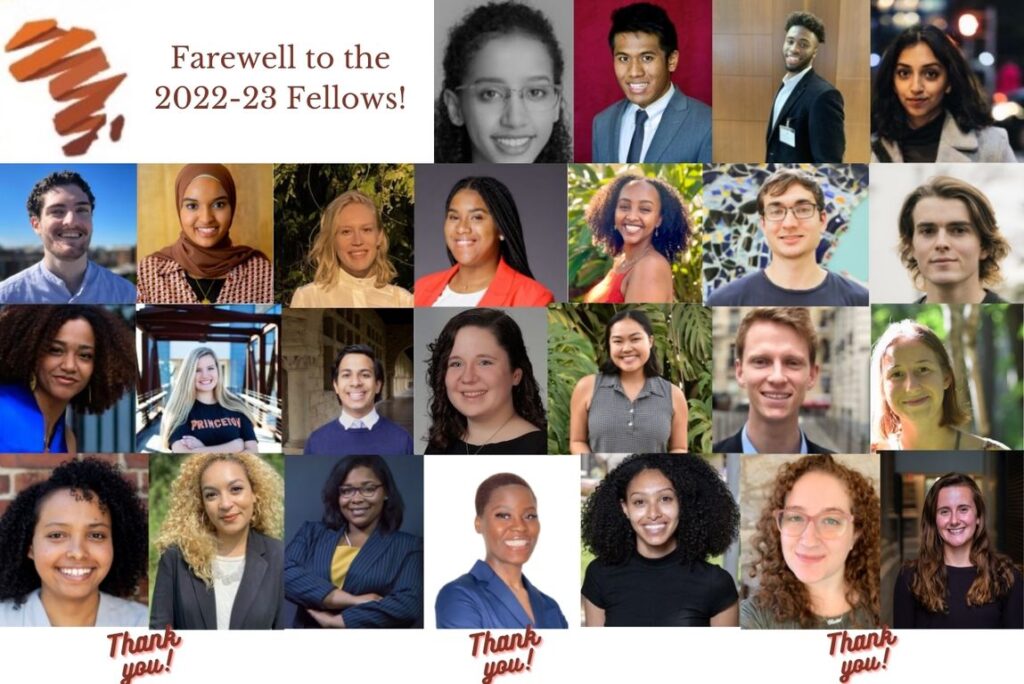
PiAf Connections
Please click below to check out pictures of our Fellows, Alums and other members of the PiAf family meeting up at home and around Africa.
Notes from the Field
By Bentley Choi, '23-'24 Fellow with Population Solutions for Health in Zimbabwe
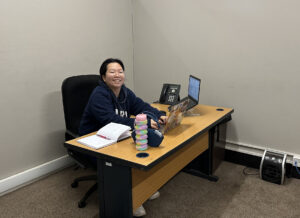
Bentley Choi (2023-24) Fellow with Population Solutions for Health, Zimbabwe
Hello! I am Bentley, and I am working as a research fellow for Population Solutions for Health in Harare, Zimbabwe. I’ve been living in Zim for just over a month and enjoying life on the continent.As a research fellow, my work is geared more toward the public than patients. My tasks are divided into three parts: technical writing, creating a research publication plan, and building PSH’s capacity to translate findings into effective communication packages. Since PSH is one of the largest local NGOs, I came across seven (!) projects, such as gender-based violence, HIV prevention, and innovation in healthcare during the first month. The office is very busy with colleagues coming and going to the field, reflecting the dynamic nature of our work. My colleagues offer me deeper insights into how public health programs run on the continent, and I help translate these projects into language that everyone can easily understand.
This fellowship has allowed me to delve into my passion for health equity, in the context of the decolonization movement in global health. I am amazed by how PSH is committed to amplifying marginalized local voices and creating an inclusive intervention for everyone. It has shown me that decolonizing public health in Africa requires much more than collective effort and continuous learning and unlearning. I’m incredibly grateful to be a part of this meaningful social change.
On the last Friday of July 2023, I met PiAf fellows in Zim – Neil Wary (2022-23), who had just left after a year at USAP Community School; Sewenet Haile (2023-24), who was just beginning her fellowship at USAP; and Sei-kashe M’pfunya (2023-24), who was about to leave for her fellowship in Kenya. While I’m no stranger to living alone in new cities, I am grateful to have co-Fellows around me as a support system for the next year. I am looking forward to immersing myself in the culture and nature of Zim.
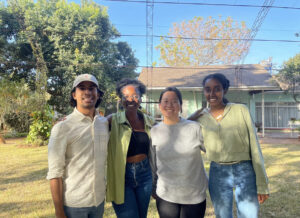
From left: Neil Wary (2022-23), Sei-kashe M’pfunya (2023-24), Bentley Choi (2023-24) and Sewenet Haile (2023-24).
Notes from the Field
Malaika Ogukwe and Idongesit Ikpang, '23-'24 Fellows with Emerging Leaders Foundation in Kenya

Malaika Ogukwe celebrates her birthday with some of the 23-24 Fellows.
Malaika Ogukwe, 2023-24 Fellow with Emerging Leaders Foundation in Kenya, was one of the last Fellows from the current cohort to arrive on site. She was met with a warm PiAf welcome upon her arrival as several Nairobi-based Fellows gather to wish her a happy birthday!
Malaika’s co-Fellow, Idongesit (ID) Ikpang, has also been supporting her as she gets acclimated. ID started his work at Emerging Leaders Foundation earlier this month and has been busy supporting ELF’s youth programming. He participated in a community service activity with his ELF colleagues to commemorate the Youth Day of Service on August 12. As part of the community service project, he planted trees and learned about environmental stewardship in Nairobi National Park.
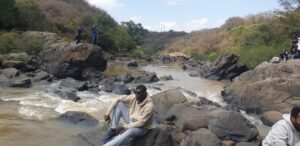
ID taking a break during his community service project at Nairobi National Park
We’re excited to see how Malaika and ID continue to support each other through their work at Emerging Leaders Foundation this year! ID is one of the five Nexus Fellows who were selected to be part of PiAf’s Nexus Pilot Program this year. The Nexus Program aims to give Fellows educated at US-accredited and African institutions the opportunity to work together during their PiAf year to foster an exchange of skills, knowledge, leadership, and technical expertise.
Notes from the Field
Krystin Anderson and Adam Hakizimana, '23-'24 Fellows at the African School of Economics
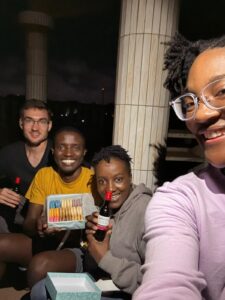
Dylan McAndrew (2022-23), Adam Hakizimana (2023-24), and Krystin Anderson (2023-24) enjoy a French treat with friends in Abomey-Calavi
Krystin Anderson and Adam Hakizimana will both be serving as PiAf Fellows at the African School of Economics (ASE) in Abomey-Calavi, Benin this year. Adam Hakizimana, who graduated from the African Leadership University in 2022, is one of Princeton in Africa’s 2023-24 Nexus Fellows. He’ll be working alongside Krystin Anderson, a 2023 graduate of the University of Florida, for the duration of the 2023-24 fellowship year. To start their co-Fellow partnership off, Krystin brought a gift of macarons and French wine from her layover in Paris to enjoy with her new ASE community!





















